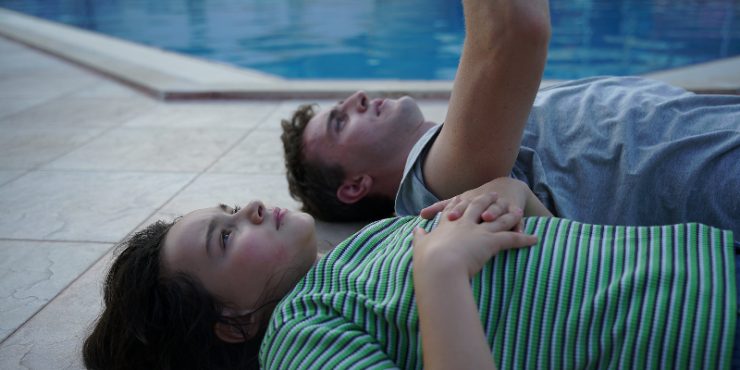The power of memory can be arresting. Fleeting, but at times vivid, they are the foundations with which we build the story of own lives. We can’t trust our memories to be accurate, but we can trust what they tell us about ourselves, and how we view the people in our lives. In Aftersun, the feature debut from writer-director Charlotte Wells, memories are mined to create an impressionistic view of a Scottish father and daughter on holiday in Turkey. Their deceivingly simple relationship grows in complexity as the story evolves, the performance of “father and daughter” shielding anxiety and gloom. They’ve brought along a DV camcorder to make endearing, handheld home videos of their time together, and Aftersun shrewdly takes advantage of this ephemeral camera style, playing like a video diary that exposes all the hidden sadnesses beneath the surface.
Irish actor Paul Mescal is Calum. At twenty-six years old, he seems a surprising choice to play a father of an eleven year old, but the choice ends up paying dividends as Mescal perfectly translates the brooding petulance and loss of youth underneath the cheerful, enthusiastic father. His daughter, Sophie, is played by Frankie Corio, whose chemistry with Mescal is the heart of the movie. Corio gives a steadied and charming performance as Sophie, a girl in between the playful fervor of childhood and the icy rebellion of adolescence. In drips and drabs, details emerge: Calum is no longer with Sophie’s mother and this holiday represents a rare time that they get to spend together. Sophie shows no signs of holding her parents’ separation against him, as their few arguments have more to do with Calum’s sudden bouts of surliness and Sophie’s natural curiosity with things she doesn’t yet understand.
Most of their time is spent playfully in the pool or scuba diving in the nearby ocean. Their resort is bordered by scenic views of mountains overlooking the stunning beaches. In quieter moments, Calum practices meditation and tai-chi, embarrassing Sophie with stoic, martial arts poses in public. Their intimate, forthcoming relationship feels ideal against the utopian setting, but hard cuts to Sophie as an adult (played by Celia Rowlson-Hall) show a much more complicated portrait. In the hindsight of adulthood, Calum’s occasional temper and pained smile take on a whole new meaning. The young Sophie is someone eager to grow up and experience the world, but Calum is a cautionary tale of what growing up too soon can do. In toeing the line between the nostalgia of reminiscence and the cold honesty of reality, Aftersun parallels a maturation process between them, and Sophie learns to accept that there is always a certain amount she’ll never understand about her mercurial father.
That realization – that your parents are fallible human beings – can be a sobering one. It’s an existential fall from grace, as he people you’ve believed to be impenetrable protectors are revealed as imperfect mortals. Aftersun might be the best interpretation I’ve ever seen of this realization. A majority of the film is spent with the young Sophie, but the small clips of her as an adult effectively recolors what we watch. While she has a blast shooting pool with teenagers and playing an arcade game with a fellow young boy (Brooklyn Toulson), Calum is fighting against his own perceived shortcomings as a father and man. It isn’t until late in the film that we learn that he is always just on the edge of a spiral, and his overall composure previously becomes that much more revelatory.
Wells takes a formalist approach: holding shots for minutes at a time, shooting her actors through mirrors, TV screen reflections, and, of course, through the grainy camcorder. The intense contrast between the crudeness of the DV footage and the austerity of Wells’ own cinematography (with DP Gregory Oke) reinforces the gap between how Sophie views Calum as a child and the truth that emerges years later. The patience Wells shows may remind some of slow cinema royalty Kelly Reichardt or the avant-garde tedium of Chantal Ackerman. Like most young filmmakers, the homages stand out, but Wells never becomes derivative. The direction here is astonishingly confident, trusting the audience’s understanding of subtext while vividly displaying her characters’ implicit desolation. Aftersun can be accurately described as a tearjerker, but none of its tears feel cheap. It earns its palpable emotional response.
I was perfectly charmed by this film. The central relationship felt real and lived in, endearing in its closeness and heartbreaking in its haunted implications. The frequent 90’s needle drops gave this rapidly-aging millennial some good doses of serotonin (never thought that the opening bars of “The Macarena” would make me smile so quickly). What’s most striking about Aftersun is the slow burn that overtakes you long after you’ve left the theater, as you come to have your own realization about Calum and Sophie and the roiling emotions behind their seemingly mundane holiday. As the pieces came together in my mind I was stuck by the profundity of what Wells accomplished, and I’m a bit at a loss to explain how she did it. Like memories, the moments throughout Aftersun can feel cursory and illusive, but it is only through the proper context that the true effect is felt.
Written and Directed by Charlotte Wells










